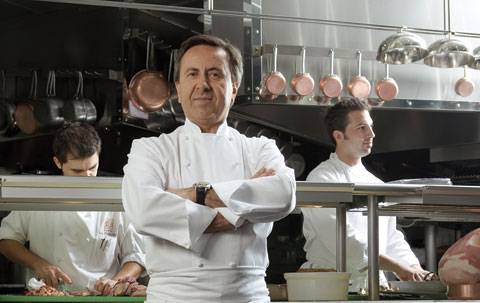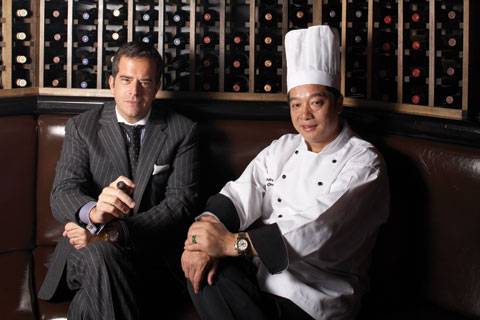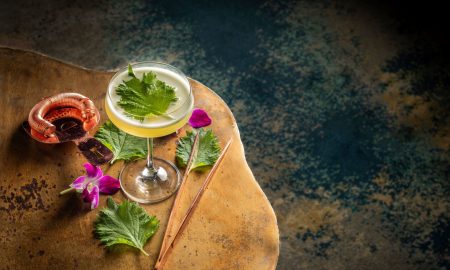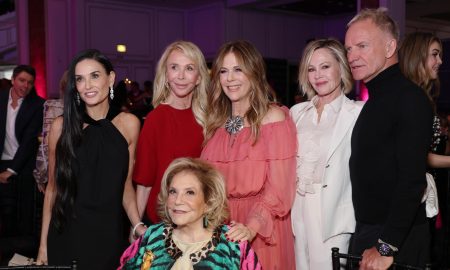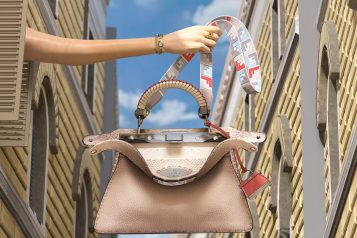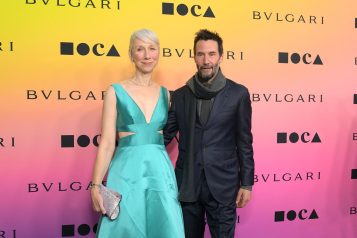Jeffrey Chodorow’s medley of top restaurants has proven he has all the ingredients necessary for success.
By Stephanie Wilson
Photography by Reynaldo Alés
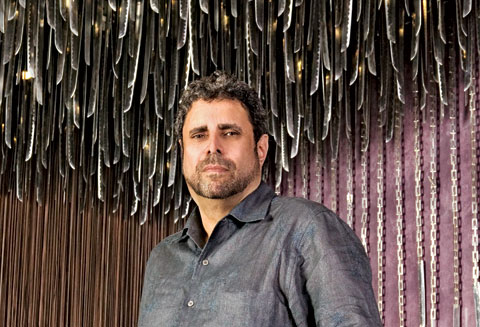
And while Chodorow could have saved himself a lot of headache and money by simply lending his name to any of a bevy of restaurants, he is a businessman.
A recent meal at Miami Beach’s latest Manhattan transplant, the acclaimed (and infamously bashed, but we’ll get to that later) Kobe Club, brought to rejoicing foodies by China Grill Management, actually was quite disconcerting. Not because of the service, which was flawless, or the cuisine, which almost surpassed that which is expected of any of the restaurants flying the China Grill flag, but rather because of the hundreds of samurai swords-sharp enough to do the damage they are known for-hanging from the ceiling, blade facing down, swaying mere feet above the diners seated below.
Jeffrey Chodorow, the man behind China Grill Management’s magic, laughs, “They are hung to accommodate Shaq’s height.” With basketball superstar Shaquille O’Neal coming in at 7-foot-1, the swords rest at 7-foot-2. Chodorow explains it’s about ambiance, about creating a feeling-almost a feeling of danger-that customers respond to. Eating in his establishments is exciting, from the décor to the cuisine, but it’s not that they are a novelty. While being novel ideas, a break from the norm, they are flawlessly executed with no detail overlooked. In fact, during our meeting, he announces his plan to lower the swords in the New York outpost of Kobe Club. “They’re too high,” he says. “They don’t make enough of an impact.” And one thing that can be said about China Grill Management’s locations is that they always make an immediate impact. For example, Kobe Club, which opened its doors to the public January 4, has already had some bold-faced names settle down in the banquets beneath the infamous swords, rocker Billy Joel included.
The reason for the immediate appeal of the high-class eatery, whose menu is laden with exotic Kobe and Kobe-style beef, has to do with one thing alone: “Why my restaurants work is that we cloak them in really cool environments and surroundings, but they’re really good restaurants,” Chodorow explains. We are sitting in the sun outside of his renowned China Grill, located at Fifth and Washington. The location is the envy of virtually every other restaurant owner in the city: Not only is the building iconic, with its colorful deco façade and infamous tower, it sits as the entrance to South Beach. But when Chodorow opened the restaurant in 1995, people thought he was crazy. The space was too large, he was spending too much money, and it was the wrong location. But as he says, “When you do something really special in Miami, people really respond to it, because they are very open to new things.” And China Grill was special. Evidenced by the 13 years of success, he was right on the money.
And it wasn’t his first time doing what others thought impossible. His first foray into the restaurant business, New York’s China Grill, began as a pipedream while Chodorow was out on the West Coast to meet with a mortgage holder for Foxborough Stadium, because the self-made Chodorow was in negotiations to buy the New England Patriots for a cool $65 million. The quest eventually got sidelined, but after dining at Wolfgang Puck’s Chinois, he knew that the restaurant business was in his future. And after that fateful meal, he had found a group of employees who wanted to jump from the Puck ship and relocate to New York City and help Chodorow open his first locale. As he says, “One thing led to another and before I knew it, I had hired seven people to come to New York and open a restaurant,” after getting Puck’s blessing to move the employees, of course. Chodorow is a gentleman. He moved the team, and put them up in hotels before he even had an inkling of the where and what of his restaurant would be. But before long, he found a space on 53rd and Sixth, worked for nine months solid, and opened a gem of an establishment that is still going strong today, more than 20 years later, a feat for any restaurant.
And while Chodorow could have saved himself a lot of headache and money by simply lending his name to any of a bevy of restaurants, he is a businessman. And like any true entrepreneur, he is a little bit of a control freak: Everything under his control must be under his control, and his steadfast devotion to his locations ensures that they stay at the top of the Zagat lists every year.
After the overwhelming success of his first China Grill in New York, Ian Schrager and Steve Rubell took note, choosing to collaborate with Chodorow for the restaurant at the Royalton Hotel. Chodorow explains that the relationship was characterized by “style being more important than function,” a concept that, at the time, was difficult for the businessman to grasp, so Chodorow sold out.
But in 1995, Schrager had opened the Delano, and the pair decided to collaborate again, because, “Ian had realized I wasn’t just a New York phenomenon, because at that time, nobody had successfully opened a New York restaurant in Miami before,” crediting that to the fact that good workers are hard to find. In the first few weeks at China Grill, he basically had a revolving door of waiters, busboys, and dishwashers because of the level of work Chodorow required of them. He won’t stand for anything less than perfection. Example: The famed crispy spinach, a China Grill New York staple, almost had to come off of the Miami menu, because with the high levels of humidity, the spinach was falling limp. To solve the problem, Chodorow hired a chemist from the University of Miami. The spinach crisped. The restaurant got four stars from The Miami Herald. “My friends say to me, ‘China Grill is everything we go to a restaurant for. Its got good food, good service, but it’s also got ambiance and environment. It’s sexy.'”
So he has taken that recipe and opened restaurants at what some describe as a frantic pace ever since, with a short hiatus in 1994 when he had a little run-in with the law after his failed venture into the airline business, which resulted in bankruptcy for Braniff Airlines. And with the outstanding success of Asia de Cuba, a Philippe Starck-designed restaurant in New York, Chodorow cemented his place as a star restaurateur. It was there that he learned to relinquish a little control. “I give Ian a lot of credit for my success because he opened my eyes to a lot of things… You know, here you have to appreciate that I’m a lawyer, I’m an accountant, a very business orientated person,” he explains. “And we were doing Asia de Cuba in New York, this was before it opened, and Ian called me one day and said, ‘I want to send out a postcard announcing Asia de Cuba in New York, and I’ll split the cost with you.’ So I said OK.” Long story short, the postcard cost thousands of dollars, and after initially putting up a fight, Chodorow relented. “I said, ‘You know what, Ian? I am going to do it, and you know why? Because I can’t sit here and pick apart your decisions.’ I don’t know which of the things he did out of the box that made him successful, I just knew he was successful… That was a major turning point for me, because I realized that I don’t know why people are successful, so I’ve got to develop this flexible spirit and do things that most people would say don’t make sense but work.”
With more than 26 restaurants under the bearing of China Grill Management-the number up for debate, even by his trusty publicists-it is almost no wonder one of them received a bad review from the New York Times, specifically from critic Frank Bruni, who gave New York’s Kobe Club zero stars. Chodorow infamously responded by taking out a full-page ad in the Times-located across from the restaurant review section, of course-to defend his good name. He lobbies that the critics aren’t qualified to be critics. “It was originally a two-page ad, they edited my ad, we negotiated over the words and I mean it’s really funny: For people who believe in free speech, they hate when you attack them back,” he laughs. “The only thing I really did say was that they should be honest enough to say that the person writing the review has no credentials.”
This ploy landed Chodorow another round of press, raising the notoriety of the restauranteur, who had already risen to fame after his NBC reality show The Restaurant, during which he famously fought with Rocco DiSpirito. But his infamy has not hurt the success of his locales, which grossed upwards of a quarter billion in 2007.
The number is likely to increase in 2008, seeing as China Grill Management is adding quite a few restaurants to their global roster, including a reincarnation of Citrus at Social in Los Angeles, a China Grill in Ft. Lauderdale, and sequel of steak houses called Maxim Prime with Maxim magazine, part of the rag’s rebranding process. He says, “I call it an ‘intelligent steakhouse for intelligent readers,'” quite the catchy phrase. The first of these is set to open in Atlanta, followed by a New York outpost in March, with Denver opening in the summer. He continues, “We’re probably going to do three restaurants in Hawaii now, and we’re going to Dubai, and the former Soviet Union, we’ve got lots going on.” Indeed. And the palates of discerning foodies around the globe are most thankful.







